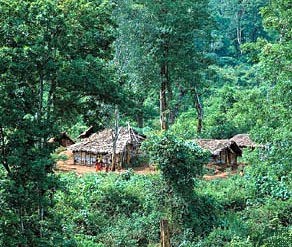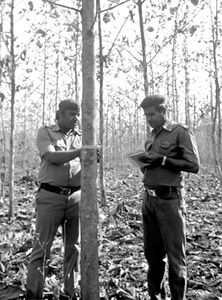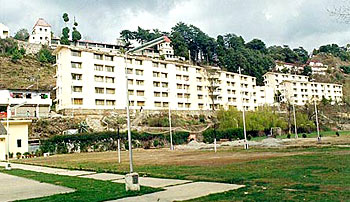 The Indian Forest Service, abbreviated as IFS is the forestry service of India. It is one of the three All India Services of the Indian government, along with the other two Indian Administrative Service and Indian Police Service. The Indian Forest Service is recruited by the national government but serve under the state governments or Central Government. The Indian Forest Service was created in 1966 for conservation, protection, and regeneration of Indian forest resources.
The Indian Forest Service, abbreviated as IFS is the forestry service of India. It is one of the three All India Services of the Indian government, along with the other two Indian Administrative Service and Indian Police Service. The Indian Forest Service is recruited by the national government but serve under the state governments or Central Government. The Indian Forest Service was created in 1966 for conservation, protection, and regeneration of Indian forest resources.
India was one of the first countries in the world to introduce scientific forest management. The British Raj established the Imperial Forest Department in 1864. In 1866 Dr. Dietrich Brandis, a German forest officer, was appointed as the Inspector General of Forests. The Imperial Forestry Service was planned under the Imperial Forest Department in 1867.
The officials appointed to the Imperial Forestry Service from 1867 to 1885 were trained in Germany and France, and from 1905 onwards at Cooper`s Hill, London, and in noted professional colleges of forestry. The University of Oxford, University of Cambridge, and University of Edinburgh had undertaken the task of training Imperial Forestry Service officers from 1905 to 1926. However, the Indian forest officers were trained at the Imperial Forest Research Institute (FRI) at Dehradun from 1927 to 1932 that was established in 1906. The Indian Forest College (IFC) was built in the 1938 at Dehradun, and officers recruited to the Superior Forest Service by the states and provinces were trained there thoroughly. The federal government managed Forestry that was transferred to the "provincial list" by the Government of India Act 1935, and recruitment to the Imperial Forestry Service was consequently discontinued.
 The modern Indian Forest Service was recognized after independence in the year 1966 under the All India Services Act 1951. The first Inspector General of Forests was Hari Singh; he acted as an instrumental in the development of the IFS. India has an area of 635,400km2 as forests that make almost about 22.27 percent of the country. India`s forest policy was created in 1894 and then updated in 1952 and again in 1988. Recruitment to the Indian Forest Service is made through the Union Public Service Commission (UPSC) on the basis of annual competitive civil service examinations.
The modern Indian Forest Service was recognized after independence in the year 1966 under the All India Services Act 1951. The first Inspector General of Forests was Hari Singh; he acted as an instrumental in the development of the IFS. India has an area of 635,400km2 as forests that make almost about 22.27 percent of the country. India`s forest policy was created in 1894 and then updated in 1952 and again in 1988. Recruitment to the Indian Forest Service is made through the Union Public Service Commission (UPSC) on the basis of annual competitive civil service examinations.
The candidates who hold a Bachelor of Science degree in mathematics, physics, chemistry, botany, zoology, geology, statistics, veterinary science and animal husbandry; or the individuals who hold a bachelor`s degree in engineering, forestry, or agriculture; or a Bachelor of Medicine and Surgery are eligible applicants of Indian Forest Service. The candidates between the ages of 21 and 30 as on July 1 of the year of the examination can appear for this examination. Upper age limits are not much restricted for scheduled castes and scheduled tribes and Other Backward Classes (SC/ST/OBC).
Notification of the Indian Forest Service Examination is generally held in February. The written essay-based examination is held during the month of July in English. Each paper in the Indian Forest Service examination is of three hours` duration. Applicants for the Indian Forest Service appear for tests on two compulsory subjects only, namely General English and General Knowledge, for 300 marks each. General English comprises of precise/summary writing, essay writing, and questions to assess reading comprehension and oral ability. General Knowledge section consists of questions that are related to the Indian political system, the Constitution of India, Indian history, Indian and world geography, general science, and national and international current events. If the candidates posses a good level of higher secondary level of knowledge, it is an advantage in the Indian Forest Service.
Two optional subjects are particularly selected by the applicant for Indian Forest Service from a lengthy list of 14 subjects, which elaborately includes among them four branches of engineering, namely the mechanical, chemical, civil, and agricultural. Each optional subject in Indian Forest Service examination has two papers, and each paper is worth 200 marks. Four combinations of similar optional subjects are not permitted: Chemical engineering and chemistry, mathematics and statistics, agricultural engineering and agriculture, and veterinary science and animal husbandry are the restricted pairs of options. Optional subject testing requires the Honours degree level of education. Candidates who qualify in the written examination of Indian Forest Service appear for an interview that is worth 300 marks. Interview questions revolve around subjects of academics; basic knowledge of forest-related issues; current affairs; knowledge of the geographical features, policies and the status of their implementation; forest cover, wildlife, and economic and cultural issues of the candidate`s community.
 Most candidates of Indian Forest Service may attempt up to four times within the specified age range. Other Backward Class (OBC) candidates are allowed a maximum of seven attempts and there are no limitations on the number of attempts for scheduled castes and scheduled tribes (SC/ST) candidates. Selected candidates of Indian Forest Service are sent for basic training at the Lal Bahadur Shastri National Academy of Administration at Mussourie. Forest Service-specific orientation classes at the Indira Gandhi National Forest Academy at Dehradun follow this, training on forest and wildlife management, surveying, soil conservation, Scheduled Tribes, and handling weapons.
Most candidates of Indian Forest Service may attempt up to four times within the specified age range. Other Backward Class (OBC) candidates are allowed a maximum of seven attempts and there are no limitations on the number of attempts for scheduled castes and scheduled tribes (SC/ST) candidates. Selected candidates of Indian Forest Service are sent for basic training at the Lal Bahadur Shastri National Academy of Administration at Mussourie. Forest Service-specific orientation classes at the Indira Gandhi National Forest Academy at Dehradun follow this, training on forest and wildlife management, surveying, soil conservation, Scheduled Tribes, and handling weapons.
Candidates of Indian Forest Service go through a year of on-the-job field training in the state to which he or she is assigned. After completing the academies, the Indian Forest Service conducts a probationary period of four years. On completion of this, the Indian Forest Service officers are appointed to the Senior Time Scale and are permitted to be posted as the Deputy Conservators of Forests or Divisional Forest Officers in charge of districts/forest divisions.
Ranks of the Indian Forest Service officers are as follows:
• Assistant Conservator of Forests
• Deputy Conservator of Forests
• Conservator of Forests (CFs)
• Chief Conservator of Forests
• Additional Principal Chief Conservator of Forests
• Principal Chief Conservator of Forests (PCCFs)
• Director General of Forests - highest post, selected from amongst the senior-most PCCFs of states.




















